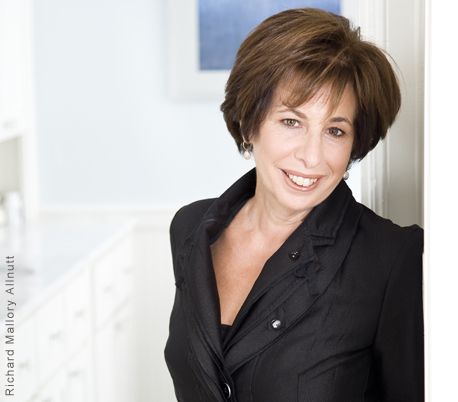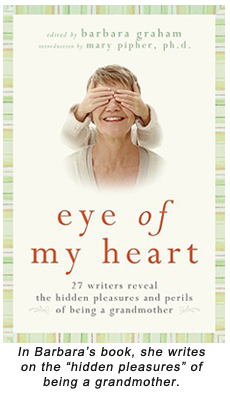
Location: Washington, DC
Age: 63
Marital Status: Married
Education: NYU
When she was 24, Barbara Graham lived with her boyfriend and their five-month-old son in a plywood shack atop a mountain in California. Today, she’s a successful writer, ensconced in a comfortable Colonial in Washington, D.C., with her wonderful husband. Barbara’s journey from hippie to hip grandmother—she’s a columnist for Grandparents.com and the author of The New York Times bestseller, Eye of My Heart: 27 Writers Reveal the Hidden Pleasures and Perils of Being a Grandmother—is heartening and inspirational.
How old are you?
63.
Tell us a bit about your background.
I was born in Pittsburgh and moved to New York when I was nine. I went to NYU in 1965, because it was the only way I could think of to live in Greenwich Village and have my father pay for it. But I really just wanted to be an actress and explore the world, so I dropped out in my sophomore year. I was interested in sex, drugs and rock ‘n roll, not school.
What did your father do?
He was a securities analyst in a brokerage house. Many members of his family worked on Wall Street, including Ben Graham, who was Warren Buffet’s mentor. My father was not in that league, though, and didn’t settle into his career until he was almost 50.
Your mother?
She was a bit of a narcissist who wanted me to be just like her. She was beautiful and stylish and kept the perfect home. We were like two landmasses that didn’t quite fit together. She died last year, at 95. In the end she came to understand and appreciate me—and vice-versa. I’m grateful for the rapprochement we achieved before she passed away.
So you were the avant-garde member of the family?
I was the black sheep. I did the opposite of everything my parents wanted me to do, which would have been to graduate college and marry a doctor. The new model for what women could do or be didn’t exist yet. This was six or seven years before feminism. It was sort of a black hole time in women’s consciousness and history. We still believed we needed a man for life to be meaningful. We weren’t worthy on our own.
What did you do after you left NYU?
I had one ridiculous clerical job after another. I worked in bookstores. My jobs didn’t last all that long—sometimes only until lunch on my first day. I also studied acting at the Herbert Berghof Studio.
Did your parents help support you?
Yes, they did, but they were not especially pleased when I hooked up with an artist/cowboy-type. Brian was the ultimate rebel.
Are you still married to him?
I never married him, but we pretended we got married for my parents’ benefit. My mother sent out a wedding announcement to her friends, then boxes from Tiffany and Georg Jensen start arriving daily at our tenement in Manhattan. I felt terribly guilty. Still, we ended up pawning the stuff and taking off for Europe.
We traveled around in a Volkswagen van. So I did the hippie thing, to the nth, nth, nth degree. I was the uber-60s child, seriously confused about who I was, but also reveling in the sense that anything was possible.
Any children with Brian?
Yes, I had a son, Clay, when I was 23. When he was born we were living on a dairy farm in British Columbia. By the time he was five months old, we’d moved to northern California and lived in a plywood shack that we built on top of a mountain. We had no plumbing, electricity, or money. We lived on welfare and odd jobs and every once in a while we’d go into a city and I would charge things to my mother’s Saks account.
Brian was your Svengali?
Originally, I shared his dream of “going back to the land.” I made a big deal of rejecting all the values my parents had tried to instill in me. I saw the light while we were living on the mountaintop, without running water or electricity. Our nearest neighbors were bears. Very hungry bears.
What did you do after your epiphany?
Clay’s father and I split when our son was two. We were living in the Silicon Valley then, before it was called that. I went back to school and also worked. When Clay was four, we moved to San Francisco and I studied theatre at San Francisco State. Later, I ran a theatre company in the city and became a theater critic for the San Francisco Bay Guardian. I wrote several plays that were produced in San Francisco and Off-Broadway in New York.
When did you start to write?
I started writing stories, plays and poems when I was a kid, but didn’t write much during the years I was off the grid.

What is Clay doing today?
He’s a phenomenally gifted photographer. He and his wife live in Paris with their two adorable daughters, ages two and five. I visit them as often as I can.
To what do you attribute your turnaround?
Going to therapy and learning what I stood for. Like many members of our 60s generation, Brian and I rebelled against conventional society, but we had little sense of what we really wanted as individuals. I’ve also practiced meditation for many years, and that’s helped enormously. And of course my writing career has brought me satisfaction and recognition. In some sense I think coming home to oneself is a lifelong process.
What’s the biggest difference between how our generation relates to our kids, compared to the way our parents’ generation related to us?
We’re the therapy generation. We talk to our kids. We share an intimacy that I certainly never had with my own parents. Our shared vocabulary includes the honest expression of feelings. But that can complicate matters when you become a grandparent, because the expectation is that the intimacy will continue. It does and it doesn’t. Clear boundaries are essential.
When did you remarry?
I met Hugh in 1982, when Clay was 10. We married in 1984. At the time we were both freelance writers living in San Francisco. Now he’s an editor and we live in Washington, D.C., where we moved in 1999.
You’ve become a successful writer.
I’ve written for many magazines, including Self, Vogue, O Magazine, and Glamour. I’ve written a lot about psychology and personal growth, as well as personal essays. After taking one self-help workshop too many in the 90s, I authored a humorous take on the subject. That book is called Women Who Run With The Poodles: Myths and Tips for Honoring Your Mood Swings.
Do you like Washington?
I like my life here, but I don’t feel as rooted here as I did in California and New York. On the plus side, I have lovely friends in DC, and live in a great house in a beautiful neighborhood near the National Cathedral.
What’s your favorite restaurant in Washington?
Palena has very, very good food. It’s mostly organic, well sourced and exquisitely prepared.
Who or what inspired you most in your life?
I had two really wonderful English teachers in high school who were incredibly supportive of my talents. Also countless books—I read constantly. Good therapists, wise friends, and spiritual teachers. My meditation practice has given me a a perspective on what really matters. I recently attended a seven-day silent retreat in California taught by Adyashanti. Life is much bigger than our egos or the stories we tell ourselves. It’s a great relief to begin to understand that.
What’s your biggest indulgence?
Ohhh… clothes, which is ironic, because that’s what my mother always wanted me to care about.
How do you define your style.
I’m kind of hip-chic, simple but not ultra-conventional.
Where do you like to shop?
Small boutiques in Paris, such as Les Ateliers de la Maille, which has really nice cashmere sweaters that are well priced. Also Cotelac in Paris. And I like Rabat in San Francisco, Pirjo in Bethesda. For a splurge, I adore clothes by Girbaud. And I love to comb flea markets for household stuff.
What’s your favorite perfume?
Quelques Fleurs by Houbigant.
What’s your favorite way to cleanse your face?
I’m always looking for the purest products for my hair and skin and I found this fabulous line of products Suki. There’s a somewhat abrasive cleanser, a moisturizing toner, a serum and more.
A favorite book?
The History of Love by Nicole Krauss. The writing is magnificent and the book is profound, funny and tragic. I love her new book, Great House, too. Books are my best friends. My favorite book so far this year was The Invisible Bridge, by Julie Orringer. It’s a powerful story set in Paris and Budapest before World War II that’s so beautifully told you find yourself hoping that what you know is going to happen to the characters won’t happen.
In Eye of My Heart, your wonderful new collections of essays, 27 writers reveal the hidden pleasures and perils of being a grandmother. What are your observations about being a grandparent?
Boomer women are redefining grandmotherhood, as we did with motherthood. The book gets the conversation going. Our grandmothers’ and mothers’ identities were mostly tied to being wives, mothers and homemakers, not to career. That’s a huge difference. My grandmother was always available to take care of me. Today, many grandparents live at great distances from their grandchildren, which presents another big challenge. And, with so much divorce and remarriage in recent decades, many families today have a bigger stable of grandparents than ever before. This also can make things a bit complicated.

You think you’ve dealt with all your stuff in therapy, and that you’re all grown up. Then you become a grandparent, which can trigger all sorts of old feelings. If you haven’t matured and mastered the art of letting go, grandparenthood can be challenging since you don’t really have a say in what happens with your grandchildren. This can be especially challenging for women who are used to speaking up in their professional lives. Becoming a grandparent is like going from being a member of the starting lineup on a baseball team to a player on the bench. It’s wondrous, but a little shock to the ego sometimes.
To learn more about Barbara Graham visit her website at http://barbaragrahamonline.com.

